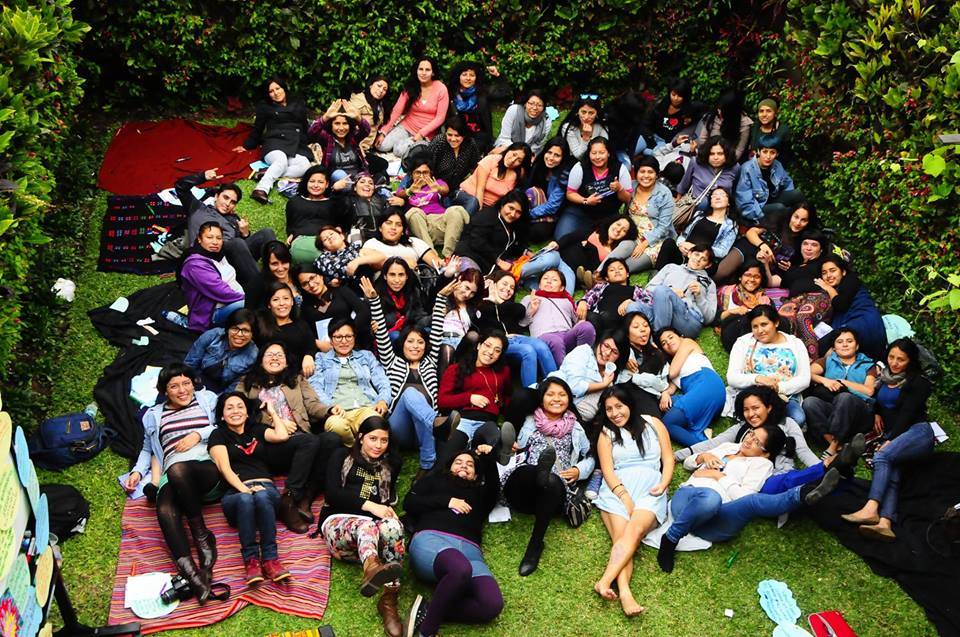Leticia Alves Maione, FRIDA Advisor for the Latin America and Caribbean Region, shares her first experience of the 13th Encuentro Feminista Latinamerico y del Caribe (Latin American and Caribbean Feminist Meeting, EFLAC).
I guess the experience of my first Latin American and Caribbean Feminist Meeting starts at the importance of having being able to make it there. And to arrive there as a young feminist, a participant of a small collective group being built with other young women who have not had this same opportunity I was granted with. Rumor has it that only 40 young women had signed up to the event, among more than a thousand participants. Well, for years I have strongly believed that young women are the majority in the feminist movement…
The young feminist access to the meeting was the theme of the “Aquelarre de Jovens Feministas”, a space of articulation attended by young women mostly from Peru, Bolivia, Brazil, Colombia and Ecuador. It took place during two days, prior to the main event. In this space, we started to build political-affective bonds, to foster complicity and diversity, factors that may overcome, perhaps, the stony schemes of “more traditional” political alliances. During some moments, I had the strong feeling that we would escape from debates that urge young women to be at the intersection of adultcentrism with other axis of oppression, the varied realities of young women in feminism and in society and the difficulty of reflecting about ourselves while being both a woman and young person at the same time.
In another space dedicated to young women during the meeting, we discussed the need to approach our proposal of youth as a category within feminism. We also confabulate about the possibility of rearticulating ourselves regionally. “If we have the will and the energy, why not make a meeting of young feminists before next EFLAC?”
As I haven´t been to previous EFLACs, I cannot compare, but during the meeting, I felt a vibration pointing to the strengthening of young women as a group. I felt this strange feeling of finding sisters who have always been physically far, but were nurturing the same ideas, dreams and emotional, political, social and cultural afflictions. We arrived there and realized we already knew each other. In a certain way, we were already interconnected in the experience that each one would live on an individual level.
I believe that as feminists, EFLAC is part of each one of us, regardless of one´s having actually attended it or not. When I started to collect the history of young women in the movement, I arrived many times at the memories of these meetings. The theoretical and political debates that these encounters foster constitute the path of the Latin American and Caribbean feminism. It is a key moment for the gathering of women across the region. It raises awareness of our common stories, besides providing exchange and contestation stimulated within feminism itself. At last, the meetings end up having a high impact in the movement´s national and local conjunctures.
If we wish, we can still observe how the discussions in the agenda of this year´s EFLAC were strongly marked by a generational perspective. The questioning of the subjects of feminism, its daily application and language, the pleasure of feminist art and culture and the alliance with nature, as well as the perception that the recognition and support among the diverse feminisms and their identities are necessary – and they have been considered by the young feminists as the axis that should cross-cut the movement. The knowledge that the majority of young women have on political culture, on their subjectivities and a range of other themes has been largely established by the experiences that we lived in different spaces and times from other feminists, who were born and educated for the most part of their lives in another periods.
Anyway, as a participant stressed, we must yet consolidate a space to exchange these subjects in order to share challenges and common bonds among young women. We have to offer the opportunity to talk and to listen to ourselves! In this sense, from the perspective of our territory of Ialodês [1], I wonder: what we, Brazilian young feminists, can do to connect regionally with young women from other parts of the AbyaYala [2] and reach an understanding beyond our borders?
Click here to access the declaration built during the “Aquelarre de Jovens Feministas” session.
*Footnotes:
1. The Ialodês, according to Jurema Werneck, are the black women from the African diasporas who give proof of the political, cultural, economical and social actions in Brazil before the rising of feminism as a theoretical and political movement in the country, as we currently know it. Jurema Werneck, De Ialodês e Feministas Reflexões sobre a ação política das mulheres negras na América Latina e no Caribe, available at :http://mulheresrebeldes.
2. Abya Yala is a rescued word, and it is revindicated by the autochthonous to refer to the territory from Alaska to Patagonia.
